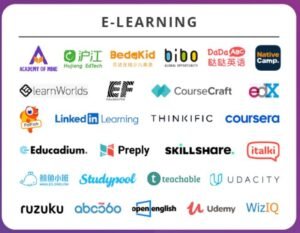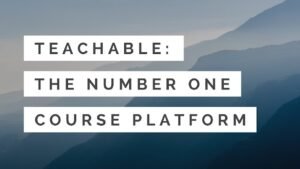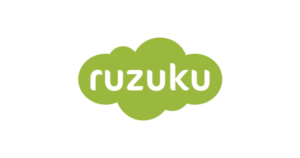10 Best Platforms To Create And Sell Online Courses In 2023
In India, there are several platforms that can help you create and sell online courses to make money. One of the most popular options is Udemy, which offers a large user base and a wide range of topics. Udemy also provides tools for marketing and promoting your courses to potential customers.
Teachable and Thinkific are also excellent platforms for creating and selling online courses, with user-friendly interfaces and flexible pricing plans. These platforms allow you to keep more of your earnings from course sales and provide tools for upselling and promoting additional courses to your students.
WizIQ is another platform that can help you make money with online courses in India, offering a range of features for live classes and interactive whiteboards. Additionally, they provide tools for creating and selling courses, as well as promoting them to a global audience.
Ultimately, the best platform for making money with online courses in India will depend on your specific goals and target audience. It’s important to consider factors like pricing, user experience, and marketing tools to find the platform that best suits your needs.
Table Of Contents
- Why Sell courses online?
- What to look in an online course selling platform?
- 10 Best Platforms To create and sell online courses
- Udemy
- Skillshare
- Thinkific
- Teachable
- Ruzuku
- LearnDash
- Podia
- Kajabi
- Academy Of Mine
- WizlQ
4. Conclusion
5. FAQs
Why Sell courses online?
What to look in an online course selling platform?
1. Udemy
Key Features:
- Course Creation: Udemy provides a range of tools to create engaging and interactive courses, including video lectures, quizzes, assignments, and discussions.
- Course Promotion: The platform allows you to market your course to a global audience and leverage Udemy’s marketing tools, including search engine optimization, email marketing, and social media promotion.
- E-commerce and Payment Processing: Udemy handles all aspects of course delivery, including e-commerce and payment processing, so you can focus on creating content.
- Reporting and Analytics: Udemy provides detailed analytics to track course performance, including student engagement and revenue.
- Community: Udemy has a thriving community of instructors and learners, providing opportunities to network and collaborate.
Pricing Plans:
Udemy has a revenue-sharing model, where instructors earn a percentage of the revenue generated from course sales. Here are some key pricing details:
- Revenue Share:
- Udemy takes a percentage of course sales revenue, which varies depending on how the course was sold. If a student finds your course through Udemy’s marketing channels, Udemy keeps 50% of the revenue, and the instructor receives 50%. If an instructor promotes their course and generates a sale, Udemy keeps 3% of the revenue, and the instructor receives 97%.
- There are also additional fees for payment processing and tax withholding, which vary by country.
- Pricing Your Course:
- Udemy recommends pricing your course between $9.99 to $199.99, depending on the length and content of the course.
- Udemy also offers a pricing strategy called “Udemy Deals,” where courses are sold at a discounted price for a limited time, to increase sales and visibility.
Remember, pricing your course is an important decision that will affect the success of your course. You should research similar courses in your niche and consider the value and quality of your course before deciding on a price.
2. Skillshare
Creating and selling a course on Skillshare is another great way to share your knowledge and expertise and earn passive income. Skillshare is a popular online learning platform that offers a wide range of courses on various topics. Here are some key features to include in your course and some pricing plans you can consider:
Key Features:
- Course Creation: Skillshare offers a range of tools to create engaging and interactive courses, including video lectures, projects, and assignments.
- Course Promotion: The platform allows you to market your course to a global audience and leverage Skillshare’s marketing tools, including email marketing and social media promotion.
- Revenue Model: Skillshare offers a royalty-based revenue model, where instructors earn a percentage of the revenue generated from course enrollments.
- Reporting and Analytics: Skillshare provides detailed analytics to track course performance, including student engagement and revenue.
- Community: Skillshare has a thriving community of instructors and learners, providing opportunities to network and collaborate.
Pricing Plans:
Skillshare offers two pricing plans for learners: a Free plan and a Premium plan. Here are some key pricing details:
- Free Plan:
- Skillshare offers a Free plan for learners that includes access to thousands of courses, but with limited features.
- Free learners can watch up to 5 hours of content per month and access some of the platform’s features.
- Premium Plan:
- Skillshare’s Premium plan costs $15/month or $99/year (Billed Annually).
- Premium learners have unlimited access to thousands of courses, along with additional features, such as offline viewing, ad-free browsing, and access to exclusive content.
In terms of pricing your course, Skillshare offers a royalty-based revenue model, where instructors earn a percentage of the revenue generated from course enrollments. The revenue share percentage depends on the number of Premium minutes your course generates each month. The more Premium minutes your course generates, the higher your revenue share percentage.
Remember, pricing your course is an important decision that will affect the success of your course. You should research similar courses in your niche and consider the value and quality of your course before deciding on a price. Additionally, promoting your course on social media and other marketing channels can help you reach a larger audience and generate more sales.
3. Thinkific
Key Features:
- Course Creation: Thinkific offers a range of tools to create engaging and interactive courses, including video lectures, quizzes, surveys, discussions, and assignments.
- Course Website: Thinkific provides a customizable website for your course, where you can brand your course and provide additional course resources and materials.
- Revenue Model: Thinkific offers a variety of revenue models, including one-time payments, subscriptions, payment plans, and bundled courses.
- E-commerce and Payment Processing: Thinkific handles all aspects of course delivery, including e-commerce and payment processing, so you can focus on creating content.
- Reporting and Analytics: Thinkific provides detailed analytics to track course performance, including student engagement and revenue.
- Community: Thinkific has a thriving community of instructors and learners, providing opportunities to network and collaborate.
Pricing Plans:
Thinkific offers four pricing plans for course creators: Free, Basic, Pro, and Premier. Here are some key pricing details:
- Free Plan:
- Thinkific’s Free plan includes basic course creation features and unlimited students.
- However, this plan includes limited features and branding options, and Thinkific charges a transaction fee of 10% on all course sales.
- Basic Plan:
- Thinkific’s Basic plan costs $49/month and includes unlimited courses and students, along with basic features.
- However, this plan still includes limited features and branding options, and Thinkific charges a transaction fee of 5% on all course sales.
- Pro Plan:
- Thinkific’s Pro plan costs $99/month and includes advanced features, such as advanced course customization, affiliate reporting, and email integrations.
- This plan also includes priority support and no transaction fees on course sales.
- Premier Plan:
- Thinkific’s Premier plan costs $499/month and includes all the features of the Pro plan, along with additional features, such as a dedicated account manager, onboarding and implementation support, and priority customer support.
In terms of pricing your course, Thinkific offers a variety of revenue models, including one-time payments, subscriptions, payment plans, and bundled courses. This allows you to choose the revenue model that best suits your course and audience.
Remember, pricing your course is an important decision that will affect the success of your course. You should research similar courses in your niche and consider the value and quality of your course before deciding on a price. Additionally, promoting your course on social media and other marketing channels can help you reach a larger audience and generate more sales.
4. Teachable
Key Features:
- Course Creation: Teachable offers a range of tools to create engaging and interactive courses, including video lectures, quizzes, surveys, discussions, and assignments.
- Customizable Website: Teachable provides a customizable website for your course, where you can brand your course and provide additional course resources and materials.
- Revenue Model: Teachable offers a variety of revenue models, including one-time payments, subscriptions, payment plans, and bundled courses.
- E-commerce and Payment Processing: Teachable handles all aspects of course delivery, including e-commerce and payment processing, so you can focus on creating content.
- Reporting and Analytics: Teachable provides detailed analytics to track course performance, including student engagement and revenue.
- Community: Teachable has a thriving community of instructors and learners, providing opportunities to network and collaborate.
Pricing Plans:
Teachable offers three pricing plans for course creators: Basic, Professional, and Business. Here are some key pricing details:
- Basic Plan:
- Teachable’s Basic plan costs $39/month and includes unlimited students and courses, along with basic features.
- This plan includes a 5% transaction fee on all course sales.
- Professional Plan:
- Teachable’s Professional plan costs $119/month and includes advanced features, such as course completion certificates, graded quizzes, and advanced reports.
- This plan includes a 2% transaction fee on all course sales.
- Business Plan:
- Teachable’s Business plan costs $299/month and includes all the features of the Professional plan, along with additional features, such as bulk student enrollments, advanced theme customization, and onboarding support.
- This plan includes no transaction fees on course sales.
In terms of pricing your course, Teachable offers a variety of revenue models, including one-time payments, subscriptions, payment plans, and bundled courses. This allows you to choose the revenue model that best suits your course and audience.
Remember, pricing your course is an important decision that will affect the success of your course. You should research similar courses in your niche and consider the value and quality of your course before deciding on a price.
5. Ruzuku
Key Features:
- Course Creation: Ruzuku offers a range of tools to create engaging and interactive courses, including video lectures, quizzes, surveys, discussions, and assignments.
- Customizable Website: Ruzuku provides a customizable website for your course, where you can brand your course and provide additional course resources and materials.
- Revenue Model: Ruzuku offers a variety of revenue models, including one-time payments, subscriptions, payment plans, and bundled courses.
- E-commerce and Payment Processing: Ruzuku handles all aspects of course delivery, including e-commerce and payment processing, so you can focus on creating content.
- Reporting and Analytics: Ruzuku provides detailed analytics to track course performance, including student engagement and revenue.
- Community: Ruzuku has a thriving community of instructors and learners, providing opportunities to network and collaborate.
Pricing Plans:
Ruzuku offers three pricing plans for course creators: Bootstrapper, Up-and-Comer, and University. Here are some key pricing details:
- Bootstrapper Plan:
- Ruzuku’s Bootstrapper plan costs $74.75/month (billed annually) and includes unlimited courses and students, along with basic features.
- This plan includes a 2.9% transaction fee on all course sales.
- Up-and-Comer Plan:
- Ruzuku’s Up-and-Comer plan costs $125/month (billed annually) and includes advanced features, such as course completion certificates, graded quizzes, and integrated email marketing.
- This plan includes no transaction fees on course sales.
- University Plan:
- Ruzuku’s University plan costs $224/month (billed annually) and includes all the features of the Up-and-Comer plan, along with additional features, such as advanced reports and priority support.
- This plan includes no transaction fees on course sales.
In terms of pricing your course, Ruzuku offers a variety of revenue models, including one-time payments, subscriptions, payment plans, and bundled courses. This allows you to choose the revenue model that best suits your course and audience.
When creating and selling your course on Ruzuku, you can leverage the platform’s customizable website, e-commerce and payment processing, and advanced analytics to create a high-quality online course. With its range of features and active community, Ruzuku is an excellent platform for creating and selling online courses.
6. LearnDash
Creating and selling a course on LearnDash is a great way to share your knowledge and expertise with a wider audience. LearnDash is a powerful Learning Management System (LMS) that allows you to create and sell your courses easily. Here are some key features to include in your course and some pricing plans you can consider:
Key Features:
- Course Creation: LearnDash offers a range of tools to create engaging and interactive courses, including video lectures, quizzes, surveys, discussions, and assignments.
- Customizable Design: LearnDash provides a customizable design for your course, where you can brand your course and provide additional course resources and materials.
- Revenue Model: LearnDash offers a variety of revenue models, including one-time payments, subscriptions, payment plans, and bundled courses.
- E-commerce and Payment Processing: LearnDash integrates with a variety of e-commerce and payment processing platforms, so you can easily accept payments for your courses.
- Reporting and Analytics: LearnDash provides detailed analytics to track course performance, including student engagement and revenue.
- Community: LearnDash has a thriving community of instructors and learners, providing opportunities to network and collaborate.
Pricing Plans:
LearnDash offers three pricing plans for course creators: Basic, Plus, and Pro. Here are some key pricing details:
- Basic Plan:
- LearnDash’s Basic plan costs $199/year and includes unlimited courses and users, along with basic features.
- This plan includes no transaction fees on course sales.
- Plus Plan:
- LearnDash’s Plus plan costs $229/year and includes additional features, such as advanced quizzes, course points, and certificates.
- This plan includes no transaction fees on course sales.
- Pro Plan:
- LearnDash’s Pro plan costs $369/year and includes all the features of the Plus plan, along with additional features, such as groups, assignments, and custom fields.
- This plan includes no transaction fees on course sales.
LearnDash also offers various features to help you market and sell your course, such as course bundles, drip content, and course certificates. Additionally, promoting your course on social media and other marketing channels can help you reach a larger audience and generate more sales.
Remember, pricing your course is an important decision that will affect the success of your course. You should research similar courses in your niche and consider the value and quality of your course before deciding on a price.
7. Podia
Creating and selling a course on Podia is a great way to share your knowledge and expertise with a wider audience. Podia is an all-in-one platform that allows you to create and sell your courses, digital downloads, and memberships easily. Here are some key features to include in your course and some pricing plans you can consider:
Key Features:
- Course Creation: Podia provides a range of tools to create courses, including video lectures, quizzes, surveys, discussions, and assignments.
- Customizable Design: Podia offers customizable design options for your course, allowing you to create a unique branding for your course and add additional resources.
- Revenue Model: Podia provides a variety of revenue models, including one-time payments, subscriptions, and payment plans.
- E-commerce and Payment Processing: Podia integrates with a variety of payment processing platforms, including Stripe and PayPal, so you can easily accept payments for your courses.
- Affiliate Marketing: Podia provides an affiliate marketing feature, allowing you to offer commissions to affiliates who promote and sell your courses.
- Email Marketing: Podia offers an integrated email marketing feature, allowing you to communicate with your students and potential customers.
Pricing Plans:
Podia offers two pricing plans for course creators: Mover and Shaker. Here are some key pricing details:
- Mover Plan:
- Podia’s Mover plan costs $39/month or $390/year and includes unlimited courses, students, and digital downloads.
- This plan includes email marketing, a custom domain, and no transaction fees on course sales.
- Shaker Plan:
- Podia’s Shaker plan costs $79/month or $790/year and includes all the features of the Mover plan, along with additional features, such as affiliate marketing and memberships.
- This plan includes email marketing, a custom domain, and no transaction fees on course sales.
Podia also offers various features to help you market and sell your course, such as email marketing, affiliate marketing, and upsells. Additionally, promoting your course on social media and other marketing channels can help you reach a larger audience and generate more sales.
8. Kajabi
Creating and selling a course on Kajabi is a great way to share your knowledge and expertise with a wider audience. Kajabi is an all-in-one platform that allows you to create and sell your courses, digital products, and memberships easily. Here are some key features to include in your course and some pricing plans you can consider:
Key Features:
- Course Content: Create high-quality content that is engaging and easy to follow. Use a mix of formats like videos, audio recordings, quizzes, and interactive assignments to keep your students engaged.
- Customization: Use Kajabi’s customization tools to personalize your course’s look and feel to match your branding and make it more appealing to your students.
- Course Analytics: Use Kajabi’s built-in analytics to track your students’ progress and identify areas that need improvement.
- Interaction: Engage your students by providing interactive elements like Q&A sessions, discussion forums, and online communities.
- Mobile-Friendly: Ensure that your course is optimized for mobile devices to make it more accessible to your students.
Pricing Plans:
- Basic Plan: This plan costs $149 per month and allows you to create up to 3 courses, 1 product, and 1 membership. You can also create landing pages and pipelines to market your course.
- Growth Plan: This plan costs $199 per month and allows you to create up to 15 courses, 1 product, and 1 membership. You can also create webinars, events, and surveys to engage with your students.
- Pro Plan: This plan costs $399 per month and allows you to create unlimited courses, products, and memberships. You can also create assessments and assignments to evaluate your students’ progress.
Kajabi also offers various features to help you market and sell your course, such as email marketing, affiliate marketing, and upsells. Additionally, promoting your course on social media and other marketing channels can help you reach a larger audience and generate more sales.
9. Academy Of Mine
Academy of Mine is a comprehensive learning management system (LMS) that enables individuals and businesses to create and sell online courses. Here are some key features and pricing plans you can consider while creating and selling your course on Academy of Mine:
Key Features:
- Custom Branding: You can customize the look and feel of your course website with your own branding, colors, and logo.
- Course Creation: Academy of Mine provides tools to create engaging and interactive courses, including multimedia content, quizzes, and assessments.
- Course Delivery: The platform allows you to deliver your courses through various formats like self-paced, instructor-led, and blended learning.
- Marketing and Sales: Academy of Mine provides a suite of marketing tools to help you promote your course, including email marketing, affiliate marketing, and social media marketing.
- Reporting and Analytics: The platform offers comprehensive analytics to track the performance of your courses and learner engagement.
Pricing Plans:
Academy of Mine offers three pricing plans: Basic, Pro, and Premier.
- Basic Plan:
- Cost: $499/month or $4,990/year (Billed Annually)
- Features:
- Custom branding
- Unlimited Courses & Students
- E-commerce and payment processing
- Integrated CRM & Email Marketing
- Basic analytics and reporting
- Unlimited Admin Users
- Pro Plan:
- Cost: $999/month or $9,990/year (Billed Annually)
- Features:
- All Basic features
- Advanced analytics and reporting
- Gamification and badges
- Custom domain and SSL certificate
- Custom course certificate and diploma
- Priority support
- Premier Plan:
- Cost: Custom Pricing (Contact Academy of Mine)
- Features:
- All Pro features
- Dedicated account manager
- Custom development and integrations
- White-label platform
- On-site training and consulting
When creating and selling your course on Academy of Mine, you can choose the pricing plan that best fits your needs and budget. You can also set the price of your course based on the value it provides and the market demand. With its advanced features and comprehensive support, Academy of Mine is an excellent platform for creating and selling online courses.
10. WizlQ
Key Features:
- Course Creation: WizIQ offers a range of tools to create interactive and engaging courses, including multimedia content, quizzes, assignments, and assessments.
- Live Classes: The platform provides tools to conduct live classes with audio, video, and screen sharing options.
- Mobile Learning: WizIQ offers a mobile app for learners to access courses on-the-go.
- E-commerce and Payment Gateway: The platform allows you to set up an online store to sell your courses and integrates with various payment gateways.
- Reporting and Analytics: WizIQ provides detailed analytics and reports to track course performance and learner engagement.
Pricing Plans:
WizIQ offers three pricing plans: Starter, Professional, and Enterprise.
- Starter Plan:
- Cost: $27/month or $324/year (Billed Annually)
- Features:
- Course creation and delivery
- Up to 10 live classes per month
- Up to 25 attendees per live class
- E-commerce and payment gateway integration
- Basic analytics and reporting
- Professional Plan:
- Cost: $79/month or $948/year (Billed Annually)
- Features:
- All Starter features
- Up to 50 live classes per month
- Up to 100 attendees per live class
- Custom branding
- Advanced analytics and reporting
- Enterprise Plan:
- Cost: Custom Pricing (Contact WizIQ)
- Features:
- All Professional features
- Unlimited live classes and attendees
- Dedicated account manager
- Custom development and integrations
- White-label platform
- On-site training and consulting
When creating and selling your course on WizIQ, you can choose the pricing plan that best suits your needs and budget. You can also set the price of your course based on the value it provides and the market demand. With its range of features and comprehensive support, WizIQ is an excellent platform for creating and selling online courses.
Conclusion
If you’re looking to create and sell courses online, there are many great platforms to choose from. Teachable, Thinkific, and Kajabi are all excellent options for creating and hosting courses on your own website. These platforms offer a wide range of features, including course creation tools, payment processing, and marketing tools to help you grow your business.
If you’re interested in reaching a larger audience, platforms like Udemy and Coursera offer access to millions of potential students. Udemy is particularly popular for its wide range of courses on a variety of topics, while Coursera offers courses from top universities and institutions around the world.
Ultimately, the best platform for you will depend on your specific needs and goals. Consider factors like course content, pricing, and marketing capabilities to determine which platform is right for you.
FAQs




















